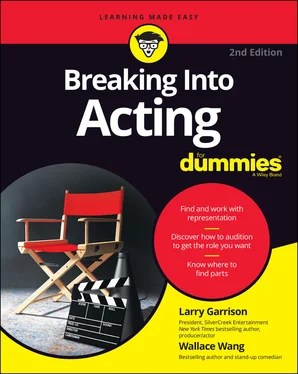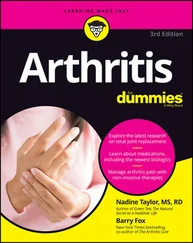Casting Networks ( https://corp.castingnetworks.com )
IMDb ( www.imdb.com )
After you completely fill out what is required, the site will post your resume with your head shots, samples of your work, and other affiliations such as agents, unions, and so forth. You then pay a fee to join the site and for any extra videos or pictures that you post.
In contrast, in the past you’d have a resume, print it, and put it on the back of an 8x10 photo to leave with the casting director, the Internet has changed the modus operandi. It’s much easier to go to these sites and revise your resume with future accomplishments.
Identifying the Info to Include
An acting resume should include the following information:
Your name.
Your representation and/or a contact cell phone number.
Your membership in any of the acting unions, such as Screen Actors Guild (SAG-AFTRA) or Actor’s Equity Association (AEA). Check out Chapter 3for more information on joining acting unions.
Your physical characteristics.
Follow up your vitals with your experience and knowledge as an actor. The bulk of your resume should list:
Any acting experience in film, television, theater. (The more, the better; and the more current, the better, too.)
Your college degree if it’s related to drama, film, or television.
Your acting training, including workshops, coaches, and classes.
Any special skills you have that may come in handy for an acting role (such as karate or snowboarding).
 Make sure you tell the truth in your resume. Otherwise, it will catch up to you. We discuss being truthful and accurate on your resume in the section, “ Avoiding Resume No-Nos,” later in this chapter.
Make sure you tell the truth in your resume. Otherwise, it will catch up to you. We discuss being truthful and accurate on your resume in the section, “ Avoiding Resume No-Nos,” later in this chapter.
 Even the most impressive resume is useless if you don’t audition well. Ultimately, what decides whether you get a role isn’t what you’ve done or how your head shot looks, but how you audition. (See Chapter 9for tips on auditioning.)
Even the most impressive resume is useless if you don’t audition well. Ultimately, what decides whether you get a role isn’t what you’ve done or how your head shot looks, but how you audition. (See Chapter 9for tips on auditioning.)
The following sections take a closer look at what information and at what level of detail you should include on your acting resume.
Your name, union membership, and contact information
The most impressive resume won’t do you any good if casting directors don’t know how to reach you. So the most important information that you need to include is your up-to-date contact information in a prominent place on your resume — usually at the top of the resume.
Your contact information should include your name and representation, your email address, and/or your contact number. Note: Some actors create an email just for their acting communications.
 Keep your contact information up to date. If you change phone numbers or representation, revise your resume with this latest contact information and destroy all copies of your old resume. The easier casting directors can find and contact you, the easier it is for them to hire you.
Keep your contact information up to date. If you change phone numbers or representation, revise your resume with this latest contact information and destroy all copies of your old resume. The easier casting directors can find and contact you, the easier it is for them to hire you.
If you belong to any of the actors’ unions, be sure to list that information on your resume, too. Union membership lends credibility to your acting career, and casting directors know that if your contact information is out of date, they can always contact the appropriate union to track you down, if necessary.
When listing your union membership, you can use the union initials, such as SAG-AFTRA (for Screen Actors Guild) and AEA (for Actor’s Equity Association) to save space and look more professional.
Your physical characteristics
Casting directors may look to your online resume to find out more about your physical appearance that your head shot can’t tell them. Your physical description, should you choose to include it, should list the following:
Height
Weight
Eye color
Hair color
 If you decide to include your physical characteristics, highlight your particularly striking features by listing them with descriptive adjectives, such as red hair or blue eyes.
If you decide to include your physical characteristics, highlight your particularly striking features by listing them with descriptive adjectives, such as red hair or blue eyes.
 Don’t lie about or exaggerate your physical characteristics. If you’re 5-8, don’t list 6-1. If your weight changes drastically, post new resumes that list your new weight. If you’ve recently dyed your hair blonde, post new resumes and list blonde as your hair color. Your resume must accurately portray who you are today, not how you were three years ago. Note that in some instances you won’t be posting a resume but simply revising the information to make it current.
Don’t lie about or exaggerate your physical characteristics. If you’re 5-8, don’t list 6-1. If your weight changes drastically, post new resumes that list your new weight. If you’ve recently dyed your hair blonde, post new resumes and list blonde as your hair color. Your resume must accurately portray who you are today, not how you were three years ago. Note that in some instances you won’t be posting a resume but simply revising the information to make it current.
No matter what your physical characteristics may be, eventually, you’ll find a role that’s just perfect for someone like you.
Your acting experience and education
Initially, you need to list every available acting experience you’ve ever had, just to fill up your resume. Eventually, as you gain more experience, you can selectively choose the more impressive roles and eliminate the less important or trivial ones, such as your bit role as a butler in a community theater or your appearance in a play put on by your college drama department.
 Even if you have experience in television commercials, never list them on your resume. If your resume says that you once did a commercial for Hertz rental cars (even if it was ten years ago), another car rental company like Avis may be reluctant to hire you for its ad campaign. Instead of listing specific commercials, play it safe and just create a commercial section on your resume, saying, “Commercial list available on request.”
Even if you have experience in television commercials, never list them on your resume. If your resume says that you once did a commercial for Hertz rental cars (even if it was ten years ago), another car rental company like Avis may be reluctant to hire you for its ad campaign. Instead of listing specific commercials, play it safe and just create a commercial section on your resume, saying, “Commercial list available on request.”
When listing your film, television, and theater experience, include the following four items for each role:
The name of the film, play, or television show you were in
The role you played
The type of role you played (lead role, featured role, supporting/guest role, or a recurring role)A lead role is considered a starring role.A featured role is a co-starring role, where you may have played a large role but weren’t necessarily the main character.A supporting/guest role is usually a small role where you had some acting and speaking parts (unlike an extra, who has no speaking roles whatsoever).On television shows, you may also have a recurring role, which means your character pops up from time to time in a few episodes of a regular show.
The studio name, television network, theater, or director you worked for
 If you played a lead role, you may want to emphasize it on your resume. If you played a minor role but worked for a major director like Steven Spielberg, you may want to emphasize your work experience with him with the supporting role you played. If you appeared in a particularly prestigious Broadway theater, you may want to mention that theater name inclusive of the type of role you played. In general, include whatever looks most impressive. Again, your agent (or someone else knowledgeable in the industry) can give you additional advice on what to highlight.
If you played a lead role, you may want to emphasize it on your resume. If you played a minor role but worked for a major director like Steven Spielberg, you may want to emphasize your work experience with him with the supporting role you played. If you appeared in a particularly prestigious Broadway theater, you may want to mention that theater name inclusive of the type of role you played. In general, include whatever looks most impressive. Again, your agent (or someone else knowledgeable in the industry) can give you additional advice on what to highlight.
Читать дальше

 Make sure you tell the truth in your resume. Otherwise, it will catch up to you. We discuss being truthful and accurate on your resume in the section, “ Avoiding Resume No-Nos,” later in this chapter.
Make sure you tell the truth in your resume. Otherwise, it will catch up to you. We discuss being truthful and accurate on your resume in the section, “ Avoiding Resume No-Nos,” later in this chapter. Even the most impressive resume is useless if you don’t audition well. Ultimately, what decides whether you get a role isn’t what you’ve done or how your head shot looks, but how you audition. (See Chapter 9for tips on auditioning.)
Even the most impressive resume is useless if you don’t audition well. Ultimately, what decides whether you get a role isn’t what you’ve done or how your head shot looks, but how you audition. (See Chapter 9for tips on auditioning.) Even if you have experience in television commercials, never list them on your resume. If your resume says that you once did a commercial for Hertz rental cars (even if it was ten years ago), another car rental company like Avis may be reluctant to hire you for its ad campaign. Instead of listing specific commercials, play it safe and just create a commercial section on your resume, saying, “Commercial list available on request.”
Even if you have experience in television commercials, never list them on your resume. If your resume says that you once did a commercial for Hertz rental cars (even if it was ten years ago), another car rental company like Avis may be reluctant to hire you for its ad campaign. Instead of listing specific commercials, play it safe and just create a commercial section on your resume, saying, “Commercial list available on request.”










